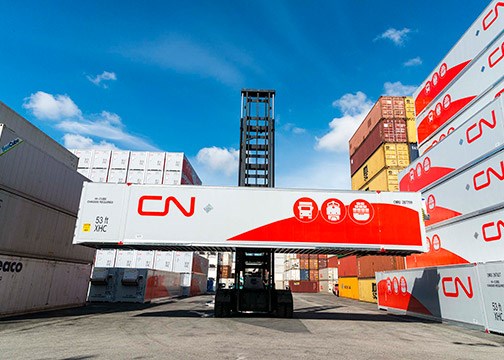In just a few hours, unless Canada’s two national railways and the union representing thousands of railway workers can reach a last-minute agreement, Canada’s railways will shut down.
Thousands of Teamsters Canada Rail Conference railway workers have been issued a lockout notices by Canadian National Railway (TSX:CNR) and Canadian Pacific Kansas City Ltd. (TSX:CP) in response to strike votes taken by the union.
As of midnight, Canada’s railways will stop operating, unless some last-minute deal can be reached.
The federal government could intervene, but the Trudeau government has signalled it is staying out of the dispute and will not use the powers it has at its disposal to force the parties into binding arbitration.
Rail disruptions in recent years due to activist blockades, floods and wildfires gives some small hint of what Canada could be in for.
“I think the pain would be felt at the industry level immediately, and at the consumer level a week later, at the most,” said Ulrich Paschen, a professor specializing in supply chains at the Melville School of Business at Kwantlen Polytechnic University.
“We always call this a supply chain, but it really is a pretty complex [network]. And if you take the two largest railroads in Canada out of that equation, you are taking a big chunk out.”
In 2020, in solidarity with the Wet’suwet’ten First Nation’s opposition to the Coastal GasLink pipeline, other Canadian First Nations blockaded railways in Eastern Canada, Manitoba and Prince Rupert for up to three weeks. It has been estimated that those blockades cost the Canadian economy about $280 million per day.
In B.C., forestry companies have had to take curtailments in recent years when freight movements were held up by backlogs or disruptions caused by floods or wildfires.
In 2021, for example, Canfor Corp. (TSX:CFP) was forced to curtail production at its Canadian sawmills, due to rail disruptions caused by wildfires, and Teck Resources Ltd.(TSX:TECK.B, NYSE:TECK) warned sales of steelmaking coal would likely be down in the third quarter of the year due to disruptions to railways.
But those were minor disruptions compared to what Canada is now facing. Canadians have not experienced a simultaneous nationwide strike at both national railways since 1950.
Some cargoes that move by freight train carry may be able to shift to truck. But there is already a shortage of drivers in Canada, so there may not be a whole lot of slack in the trucking sector.
For bulk commodity producers and farmers that rely on railways to move goods, there may be no other option but to shut down their own operations and lay off their own workers, if the strike last more than a few days.
A full rail stoppage would cost the Canadian economy $1 billion a day, says the Canadian Manufacturers and Exporters (CME), and will also shut down of commuter rail services in Toronto, Vancouver, and Montreal. (In Vancouver, the West Coast Express to Mission would be shut down.)
The CME estimates that $531 million worth of manufactured goods would be stranded each day of the strike.
Mining, agriculture and manufacturing will be hardest hit sectors, says the Conference Board of Canada.
In B.C., the forestry sector would be affected, as wood pellet producers, pulp and paper mills and sawmills all rely on rail.
"Impacts on production are likely to occur within less than a week, with the threat of complete mill shutdowns and furloughing close behind,” warns the Forest Products Association of Canada.
“Within the first week of a strike, we could face widespread mill curtailments, further threatening jobs and economic activity in our communities,” said Kurt Niquidet, vice president and chief economist of the BC Council of Forest Industries.
Agriculture would be heavily impacted by a prolonged rail shutdown, including livestock.
“A prolonged rail disruption could result in a backlog of livestock slaughterhouse capacity which could in turn have negative impacts on supply chains and animal welfare,” says the Canadian Federation of Agriculture.
Trevor Heaver, professor emeritus and former director of the Centre for Transportation Studies at the University of BC’s Sauder School of Business, is surprised by the hands-off approach the Trudeau government has taken.
“I will accept that there is a cost to intervening and disrupting the normal bargaining process,” Heaver said. “But the cost of closing down both railways is huge. And I’m not sure that the government’s got it right in saying that it won’t intervene.”
“Even if the strike miraculously does not take place, there are already significant costs in disruptions,” Heaver noted.
Railways have already implemented embargoes and stopped receiving certain goods in anticipation of a shutdown, and some shippers may have already either overstocked inventories or contracted trucking fleets to move goods, he said, all of which increases operating costs.
The Trudeau government may not come under intense pressure to intervene in the dispute until consumers start feeling the pinch and noticing certain goods missing from store shelves.
“I think it will trickle down to consumers pretty quickly,” Paschen said. “I’d be surprised if this went a week.”



